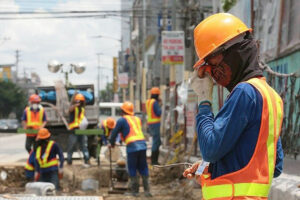THE Department of Finance (DoF) said infrastructure spending need not be “sacrificed” in the process of reducing the budget deficit, which is expected to contract even with no new taxes and shrink even faster if the government can find additional funding of P250 billion a year.
In an economic bulletin on Tuesday, DoF Chief Economist Gil S. Beltran said the way forward will involve “shoring up revenue and cutting non-priority expenditure… without sacrificing infrastructure spending.”
He said that assuming no new taxes, the deficit is expected to hit the equivalent of 4.1% of gross domestic product (GDP) by 2025, down from the 2021 deficit-to-GDP ratio of 8.6%. Raising an additional P250 billion a year would bring the ratio down to 3.2% by 2025, just under the pre-pandemic level of 3.4%.
“It is therefore important to restore fiscal health and build up reserves when the economic weather is fine so as to have the capacity to respond again should shocks materialize,” Mr. Beltran added. “This is akin to having an insurance (policy) that covers for contingencies. Not having one is a fool’s game and fiscal heartaches hit the hardest when it’s too late.”
Separately, Manulife Philippines Head of Equities Mark A. Canizares said in a statement on Tuesday that it considers infrastructure and mining to be critical for the incoming administration.
The statement, which referenced Manulife Investment Management’s outlook for the market in the context of the impending change of government, declared the Philippines to be on a recovery path from the pandemic, after the economy posted 8.3% growth during the first quarter.
“Infrastructure-related sectors are likely to benefit from the priorities of the incoming administration,” Mr. Canizares said. “We expect a continuation of the decentralization of infrastructure investment.”
Mr. Canizares noted that under the Duterte administration, Mindanao was a main recipient of infrastructure projects, including the Davao City Bypass Construction and Coastal Road projects, the loans for which were obtained at the height of the pandemic in 2020.
“Mining is another sector that could be in focus. Marcos has previously said that he wants better laws and regulations on mining for the industry to contribute more to the economy,” he added.
He said his view on the utility sector is more subdued, given Mr. Marcos’ comments on lowering energy costs.
Aside from continuing with the Build, Build, Build program, Mr. Marcos also earlier signaled his plans to reduce the price of rice to P20 per kilo and reopen the Bataan Nuclear Power Plant.
“Key to the success of these programs is the passage of revenue-enhancing measures that can expand the contribution of fiscal spending to economic growth. This will allay fears of a blowup in the country’s fiscal balances and a runaway increase in debt levels which hounded the later years of the first Marcos presidency.”
Mr. Canizares also warned that the economic recovery remains fragile, with consumer spending at risk of slowing down due to the continued increase in prices.
Headline inflation in May was 5.4%, accelerating from the 4.9% posted in April. The May result was within the central bank’s 5-5.8% target range.
Inflation was driven mainly by rising costs of food, non-alcoholic beverages, and fuel. — Tobias Jared Tomas
